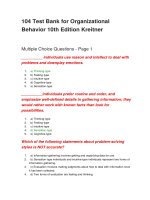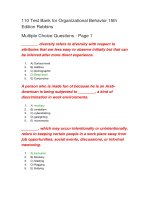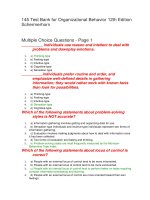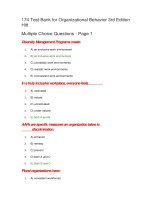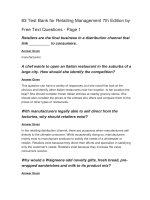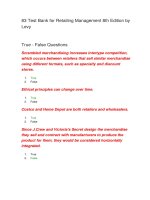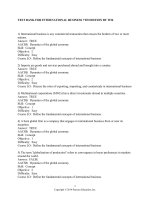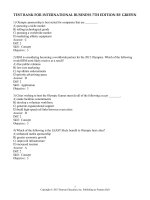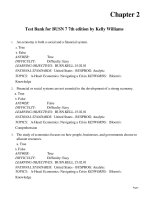83 test bank for retailing management 7th edition by
Bạn đang xem bản rút gọn của tài liệu. Xem và tải ngay bản đầy đủ của tài liệu tại đây (110.67 KB, 23 trang )
83 Test Bank for Retailing Management 7th Edition by
Free Text Questions - Page 1
Retailers are the final business in a distribution channel that link
__________ to consumers.
Answer Given
manufacturers
A chef wants to open an Italian restaurant in the suburbs of a large city.
How should she identify the competition?
Answer Given
This question can have a variety of responses, but she could first look at the
obvious and identify other Italian restaurants near her location. Is her location the
best? She should consider frozen Italian entrees at nearby grocery stores. She
should also consider the prices of the entrees she offers and compare them to the
prices of other types of restaurants.
With manufacturers legally able to sell direct from the factories, why
should retailers exist?
Answer Given
In the retailing distribution channel, there are occasions when manufacturers sell
directly to the ultimate consumer. While occasionally doing so, manufacturers
mainly exist to manufacture products to satisfy the needs of a wholesaler or
retailer. Retailers exist because they direct their efforts and specialize in satisfying
only the customer's needs. Retailers exist because they increase the value
consumers receive.
Why would a Walgreens add novelty gifts, fresh bread, pre-wrapped
sandwiches and milk to its product mix?
Answer Given
Walgreens is engaging in scrambled merchandising. They have added these
products; and therefore, appeal more to a broader group of customers, while
providing one-stop shopping for our time-starved society.
A _____________ is a set of businesses that move products from the point
of production to the point of sale to the ultimate consumer.
Answer Given
distribution channel
List the four functions performed by retailers.
Answer Given
The four functions performed by retailers are (1) providing an assortment of
products and services, (2) breaking bulk, (3) holding inventory, and (4) providing
services.
What are the three things identified by a retail strategy statement?
Answer Given
(1) The target market toward which the retailer will direct its efforts, (2) the nature
of the merchandise and services the retailer will offer to satisfy the needs of the
target market, and (3) how the retailer will build a long-term advantage over its
competitors.
Distinguish between intratype competition and intertype competition. Give
an example of each.
Answer Given
Intratype competition refers to the competition between retailers with the same
format. An example would be the competition between Publix and BiLo for sale of
fresh salmon. Intertype competition refers to retailers that sell similar merchandise
using different formats. An example would be the sale of Revlon Color-Stay
Lipstick between CVS and Target.
Renting a tuxedo, the purchase of a DVD on Amazon.com, buying a Ronco
Veg-O-Matic after watching an infomercial, and getting a facial are all
examples of ________ activities--the sale of goods and services to the
ultimate consumer.
Answer Given
retailing
Why do retailers consider customers important when developing a retail
strategy?
Answer Given
Retailers need to understand customers and how they are changing so that they
can better satisfy their needs. Retailers need to know and understand why
customers shop, how they select stores and how they select from that store's
merchandise.
The success of discount stores poses a growing threat for JCPenney. To
compete effectively with these retailers, the company instituted some
radical changes. Discuss four changes the company made and how
JCPenney expects the changes to better satisfy its target market?
Answer Given
(1) JCPenney is reducing its distribution costs by shipping merchandise through
its distribution centers rather than using direct delivery from vendors to stores. (2)
JCPenney centralized merchandise management. Rather than having sore
managers make merchandise decisions, merchandise decisions are made by
JCPenney buyers in the corporate headquarters to save costs and respond
quicker. (3) To increase customer convenience, JCPenney is building new stores
off the mall. (4) To increase convenience, the company is also installing
centralized checkout counters in each area of the store.
What is the retailer's role in a supply chain?
Answer Given
The retailer's role in the distribution channel is to link manufacturers with
consumers by directing their efforts to satisfying the needs of the ultimate
consumers.
Why is location strategy important for both consumers and for
competitive reasons?
Answer Given
(1) Location is typically the most important characteristic consumers consider
when selecting a store. (2) A good location creates a long-term advantage over
the competition.
A _____ is a business that sells products and services to ultimate
consumers.
Answer Given
retailer
29 Free Test Bank for Retailing Management 7th
Edition by Levy Free Text Questions - Page 2
When a retailer like L.L. Bean designs merchandise as well as sells the
merchandise, _________ is occurring.
Answer Given
vertical integration
What is the first step in the retail management decision process?
Answer Given
getting an understanding of the world of retailing
The philosophy, strategies, programs and systems that focus on
identifying and building loyalty with a retailer's most valued customers are
called _______________.
Answer Given
customer relationship management
Why do retailers use point of sale (POS) terminals to read Universal
Product Codes (UPC) and electronic data interchange (EDI) to send sales
and inventory information from computer to computer?
Answer Given
These technologies allow retailers to have a better idea of what is selling and a
way to quickly communicate that information to vendors so that replenishment can
quickly occur. Additionally it gives the retailer a competitive advantage over
retailers that do not work with current supply chain management systems.
Scrambled merchandising increases _______, which occurs between
retailers that sell similar merchandise using different formats, such as
specialty and discount stores.
Answer Given
intertype competition
When is the intensity of competition between retail stores the greatest?
Answer Given
when they are involved in intratype competition
Costco buys directly from manufacturers. They have merchandise
shipped to their warehouses for storage, and then distribute the
merchandise to their stores. What term is used to describe this type of
activity?
Answer Given
vertical integration
_________ are the principles governing the behavior of individuals and
companies.
Answer Given
Ethics
When Austin saw pastries and coffee at his local bookstore, he knew it
was an example of __________, which is the juxtaposition of unrelated
merchandise in the store.
Answer Given
scrambled merchandise
When making the strategic and tactical decisions managers need to
consider the effects of their decisions on the profitability of their firms and
the satisfaction of their customers. What other implications must
managers consider as a result of their decisions?
Answer Given
ethical and legal implications
By providing assortments, breaking bulk, holding inventory, and
providing services, retailers increase the ___________ consumers receive
from their products and services.
Answer Given
value
Which retailer had its humble beginnings in rural Arkansas and now is the
largest retailer in the world?
Answer Given
Wal-Mart
What type of merchandising increases intertype competition?
Answer Given
scrambled merchandising
Best Buy purchases many of the CD's, Playstation 2 games, DVD's and
DVD players by the truckload then sells them in smaller quantities to its
stores where consumers are allowed to buy them one at a time. What
business function is Best Buy performing?
Answer Given
breaking bulk
_______________ describes the voluntary actions taken by a company to
address the ethical, social, and environmental impacts of its business
operations and the concerns of its stakeholders.
Answer Given
Corporate social responsibility
Multiple Choice Questions
Which of the following strategies has JCPenney changed to compete
effectively with the competition in the past?
1.
A. JCPenney centralized merchandise management.
2.
B. JCPenney is building new stores off the mall.
3.
C. JCPenney is designing stores with centralized checkout.
4.
D. JCPenney now ships merchandise through distribution centers.
5.
6.
E. JCPenney is upgrading its merchandise offering by adding France's cosmetics
Sephora.
F. All of the above
Once a retailer understands its environment, it needs to develop and
implement a:
1.
A. viable customer base
2.
B. advertising plan
3.
C. retail strategy
4.
D. competitive strategy
5.
E. functional strategy
A retailer's role in a supply chain is to:
1.
A. act as the liaison between manufacturers and wholesalers
2.
B. buy merchandise exclusively from the manufacturers
3.
C. negotiate with manufacturers to eliminate a wholesaler
4.
D. satisfy the needs of the consumers
5.
E. sell to wholesalers
Which of the following would be an example of intertype competition?
1.
A. a supermarket and a fresh flower stand
2.
B. a specialty store and a fast food restaurant
3.
C. a supercenter and a pharmacy
4.
D. a convenience store and a department store
5.
E. all of the above
When Taco Bell opened its first restaurant, a hungry patron could order a
taco, a burrito and a Coke. In those early years, Taco Bell did not offer
much:
1.
A. assortment
2.
B. product depth
3.
C. quantity
4.
D. value
5.
E. variety
Which of the following is part of a retailer's retail mix?
1.
A. advertising
2.
B. displays
3.
C. trained salespeople
4.
D. services offered
5.
E. all of the above
Which of the following is NOT TRUE in describing distribution systems
within major international markets?
1.
A. The U.S. distribution system has the greatest retail density and the greatest
concentration of large retail firms.
2.
B. The Indian distribution systems are characterized by small stores operated by
small firms and a large independent wholesale industry.
3.
C. In the Chinese distribution system, the merchandise often passes through
several levels of distribution to make the daily deliveries to the small retailers
efficient.
4.
D. Northern European retailing is similar to efficient distribution system in the U.S.
5.
E. Southern European retailing is fragmented across all sectors.
6.
F. All of the above is true.
7.
G. None of the above is true.
A retailer that is vertically integrated:
1.
A. concentrates on selling to businesses only
2.
B. does not have frequent communication between buyers and managers
3.
C. has an excellent vertical relationship between corporate and stores
4.
5.
D. performs more than one function in the chain from manufacturing to sales to
end user
E. performs only one function to end user
The retail strategy helps a retailer to identify the following EXCEPT:
1.
2.
A. The target market toward which the retailer will direct its efforts.
B. The nature of the merchandise and services the retailer will offer to satisfy the
needs of the target market.
3.
C. How the retailer will build a long-term advantage over its competitors.
4.
D. Break-even point for making profits
5.
E. All of the above
______________ is when a firm performs more than one set of activities in
a channel.
1.
A. Channel diversification
2.
B. Horizontal development
3.
C. Horizontal integration
4.
D. Vertical development
5.
E. Vertical integration
Once a well-articulated retail strategy has been developed, the next step is
to:
1.
A. override the control mechanism
2.
B. evaluate the results of the strategy
3.
C. forecast future environmental trends
4.
D. confirm that environmental conditions have not changed
5.
E. implement the strategy
To implement a retail strategy, a retailer must develop a _____ that
satisfies the needs of its target market better than its competitors.
1.
A. production orientation
2.
B. horizontal integration
3.
C. sales orientation.
4.
D. retail mix.
5.
E. situation analysis
What is retailing?
1.
2.
A. It is the merchandising component of the retail mix.
B. It is the set of business activities that adds value to the products and services
sold to consumers for their personal use.
3.
C. It is the strategy retailers and vendors use to get products into the stores.
4.
D. It is the process of offering products in smaller quantities for consumer
consumption patterns.
5.
E. It is the ability to offer enough variety in a store to encourage one-stop
shopping.
Since convenience of location is important in store choice, a store's
proximity to competitors is a critical factor in identifying:
1.
A. competition
2.
B. ethical standards
3.
C. real estate negotiations
4.
D. the target market
5.
E. which merchandise to scramble
_______________ occurs when a manufacturer undertakes retailing
activities.
1.
A. Private label business
2.
B. Product-related marketing
3.
C. Backward integration
4.
D. Horizontal integration
5.
E. Forward integration
A(n) ______________ is a set of firms that make and deliver a given set of
goods and services to the ultimate consumer.
1.
A. supply chain
2.
B. buying network
3.
C. trade association
4.
D. integrated wholesale network
One of the functions retailers undertake to increase the customer's
perception of value is providing services. Which of the following would be
an example of that activity?
1.
A. clean restrooms
2.
B. displaying merchandise
3.
C. having trained salespeople available to answer questions
4.
D. well-lit parking
5.
E. all of the above
A credit union holds and maintains detailed records of the banking
activities of its members. Each quarter, the credit union provides its
members a printout of banking activities, information about low rate loans
and pre-owned automobiles. By contacting its members on a regular
basis, the credit union is engaging in the business function of:
1.
A. breaking bulk
2.
B. holding inventory
3.
C. providing assortments
4.
D. financing
5.
E. providing services
The combination of factors retailers use to satisfy customer needs and
influence their purchase decisions is called the firm's:
1.
A. retailing conglomerate
2.
B. retail mix
3.
C. marketing strategy
4.
D. target group
5.
E. none of the above
Which of the following would be an intratype competitor for a Home Depot
supermarket?
1.
A. Target
2.
B. Lowe's
3.
C. Kroger
4.
D. Macy's
5.
E. All of the above
Providing assortments is an advantageous business activity because:
1.
2.
3.
4.
5.
A. it enables the company to create a more informational and entertaining
environment that would promote more sales
B. it enables the company to reinvest for the future of the business.
C. it enables the customer to choose from a wide selection of brands, designs,
sizes and prices all in one store
D. it enables the customer to try more products
E. It enables the customer to stock up on the assortments because of bulk
availability.
Macy's, Belk, JCPenney and Nordstrom are ___________ competitors.
1.
A. channel
2.
B. vertical
3.
C. intertype
4.
D. intratype
5.
E. none of the above
Which of the following statements about the U.S. distribution system is
true?
1.
2.
A. Many people think the United States is understored.
B. Many U.S. retailers are large enough to have their own warehouses and have
eliminated their need for wholesalers.
3.
C. When compared to retail density in Europe, the United States is very low.
4.
D. The small specialty store is the fastest growing type of U.S. retailer.
5.
E. All of the above statements about the U.S. distribution system are false.
The competition between the same types of retailers is called:
1.
A. intertype competition
2.
B. indirect competition
3.
C. intratype competition
4.
D. scrambled merchandising
5.
E. vertical integration
When considering the largest retailers worldwide, ___________ retailers
continue to dominate among them.
1.
A. food
2.
B. apparel
3.
C. drug
4.
D. home-improvement
5.
E. Internet
The decisions that retail manger make include:
1.
A. Selecting their target markets
2.
B. Selecting retail locations
3.
C. Negotiating with suppliers
4.
D. Training and motivating sales associates
5.
E. All of the above
__________________ arises when a retailer performs some distribution
and manufacturing activities, such as operating warehouses or designing
private-label merchandise.
1.
A. Globalization
2.
B. Product-related marketing
3.
C. Backward integration
4.
D. Horizontal integration
5.
E. Forward integration
While vacationing at the beach, Delia was delighted to see that the local
Walgreens carried milk, bread, apples and bananas. Her delight indicates
she has never seen:
1.
A. a deep product assortment
2.
B. an acceptable merchandising mix
3.
C. a retail mix
4.
D. scrambled merchandising
5.
E. this type of intratype competition
Dillards sells Godiva chocolates and coffees in their stores. By selling
such products, Dillards is:
1.
A. offering a good merchandise mix
2.
B. offering what the market demands
3.
C. offering deep product assortments
4.
D. practicing scrambled merchandising
5.
E. practicing intratype competition
Which of the following is NOT an element in the retail mix?
1.
A. competitive response
2.
B. merchandise assortments
3.
C. location
4.
D. customer service
5.
E. advertising and promotion
Which of the following statements about retailers holding inventory is
FALSE?
1.
A. By having inventory held in the store, consumers can hold less merchandise at
home.
2.
B. By holding inventory, retailers can decrease the visual merchandising
expenditure.
3.
C. Holding inventory in a store helps serve the customer's needs.
4.
D. Retailers keep inventory so products are available when consumers want them.
5.
E. Holding inventory reduces consumer's cost of storing products.
The Lands' End Web site, the JCPenney catalog, and the Sears area all in
____________ competition.
1.
A. channel
2.
B. horizontal
3.
C. indirect
4.
D. intertype
5.
E. intratype
What is variety?
1.
A. Variety is the number of different items in a category.
2.
B. Variety is the number of different SKU's within a merchandise category.
3.
C. Variety is the number of different merchandise categories within a store.
4.
D. Variety is another term for scrambled merchandising.
5.
E. Variety is the number of different facets of the business plan.
The offering of merchandise not typically associated with the store type is
called:
1.
A. scrambled merchandising
2.
B. intratype competition
3.
C. product diversification
4.
D. channel conflict
5.
E. vertical differentiation
Retailing is one of the nation's largest industries in terms of:
1.
A. community involvement
2.
B. employment
3.
C. competition
4.
D. promotions
5.
E. variety
Which of the following parts of the retail mix can be utilized by a small
hardware store?
1.
A. bright lighting in the store, which makes it easier to read the messages
2.
B. a new ad campaign that uses both radio and newspaper media
3.
C. store location next door to a hospital
4.
D. attractive point-of-purchase displays at the ends of the store's aisles
5.
E. all of the above
Which of the following businesses would be considered a retailer?
1.
A. a hot dog cart at the Highland Games
2.
B. Delta Airlines
3.
C. University bookstore
4.
D. Priceline.com
5.
E. all of the above
Which of the following is NOT TRUE when explaining what created
differences within the distribution system of the major international
markets?
1.
A. China and India have many large businesses to reduce unemployment.
2.
B. E.U. has many large retailers to achieve economy of scales.
3.
C. E.U. countries protect small retailers.
4.
D. China has many large retailers because it has an abundance of low-cost real
estate available for building large stores.
Why is it advantageous for retailers to be vertically integrated?
1.
A. It is advantageous because retailers can develop unique merchandise sold only
in their stores.
2.
B. Retailers can expand their services easily to the Internet because they can
direct orders to the manufacturer
3.
C. Retailers have realized that to stay competitive, they must become vertically
integrated
4.
D. Customers prefer retailers who are vertically integrated.
5.
E. There is no advantage to being vertically integrated.
What are the principles governing the behavior of the individual and the
company?
1.
A. ethics
2.
B. retail strategy
3.
C. training guidelines
4.
D. company culture
5.
E. Civil Rights Act of 1964
A ______________ is a business that sells products and/or services to
consumers for their personal or family use.
1.
A. manufacturer
2.
B. wholesaler
3.
C. retailer
4.
D. Distributor
Why is it imperative that manufacturers like Apple Computer and Proctor
and Gamble understand how retailers operate?
1.
2.
A. Manufacturers will be able to sell directly on-line.
B. Manufacturers will understand how to get their products on the shelves and
sold to the customer.
3.
C. Manufacturers can better sell merchandise without retailers.
4.
D. Retailers can expect fewer buyouts to occur.
5.
E. Manufacturers can limit multi-channel integration
The intensity of competition is greatest among retailers when:
1.
A. price dominates the retail mix
2.
B. they are located near each other and offer similar retail offerings
3.
C. they are located near each other and target the same customer
4.
D. they are located far from each other and offer similar retail offerings
5.
E. they are located far from each other and target the same customer
The Chinese distribution system:
1.
A. has more people employed in distribution than the U.S.
2.
B. is characterized by small stores with a large wholesale industry
3.
C. is more efficient than the distribution system in the U.S.
4.
D. is more similar to U.S. distribution systems than Europe's systems
5.
E. none of the above
Victoria's Secret, a popular retail chain in women's lingerie and perfume,
design the merchandise they sell, and then contract with manufacturers to
produce it exclusively for them. Victoria's Secret is practicing:
1.
A. globalization
2.
B. product-related marketing
3.
C. vertical integration
4.
D. horizontal integration
5.
E. product diversification
What factors have created differences in the distribution systems in the
major markets?
1.
A. geography
2.
B. market size
3.
C. the high population density in Europe, China, and India
4.
D. different social and political objectives
5.
E. all of the above
If a chain of florist shops opened a plant nursery to provide gift plants and
cut flowers to all of its outlets within a 300-mile radius, the chain would be
practicing
1.
A. vertical integration.
2.
B. channel expansion.
3.
C. horizontal expansion.
4.
D. opportunity incrementing.
5.
E. service marketing.
The fastest growing retailers in the United States sell through:
1.
A. kiosks in malls and department stores
2.
B. large stores with over 20,000 square feet
3.
C. outlet stores
4.
D. small specialty stores
5.
E. the Internet
When developing the _________________ for his new barber shop, Theo
decided to obtain a long-term competitive advantage over other salons by
offering longer hours, better prices, a well trained staff and half-price
perm day every Wednesday to attract customers.
1.
A. selling concept
2.
B. business cycle
3.
C. retail strategy
4.
D. focal point orientation
5.
E. marketing concept
Retailers provide important functions that increase the value of the
products and services they sell to consumers. Which of the following
does not include value function created by a retailer?
1.
A. Providing an assortment of products and services
2.
B. Reducing production costs with innovative design
3.
C. Breaking bulk
4.
D. Holding inventory
5.
E. Providing services
As the owner of a store specializing in men's suits, Isabella can use a
retail strategy statement to identify all of the following EXCEPT:
1.
A. the advertising campaign developed to sell last season's merchandise
2.
B. the shop's target market
3.
C. how the store will build a competitive advantage over Men's Warehouse
4.
D. what services the shop will offer its customers
5.
E. what types of suits the store will stock
Increasing intertype competition has made it harder for retailers to identify
their:
1.
A. competition
2.
B. target market
3.
C. merchandise mix
4.
D. retail mix
5.
E. none of the above
CVS, Walgreens and Rite Aid are _________ competitors.
1.
A. indirect
2.
B. intratype
3.
C. intertype
4.
D. vertical
5.
E. horizontal
Scrambled merchandising increases:
1.
A. vertical integration
2.
B. intertype competition
3.
C. concentric diversification
4.
D. horizontal integration
5.
E. intratype competition
